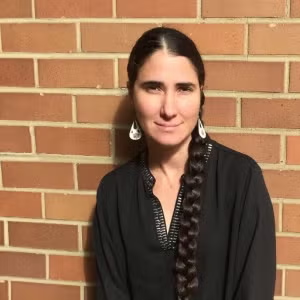Power outages – some lasting for up to several days – have plagued Cuba since last year, intensifying in frequency since September 2025.
In addition to disrupting daily life, for journalists working on the island and independent media that operate solely online, they’ve deepened the information blackout and added to restrictions imposed by the State.
“Right now, the blackouts are affecting the work of the newspaper 14ymedio as much as the repression,” journalist Yoani Sánchez, director of the digital outlet, told LatAm Journalism Review (LJR).
With a loss of power comes a loss of internet connectivity, affecting everything from communication with sources to the very ability to update and access websites.
Moreover, these outages are taking a toll on the physical and mental health of Cuban journalists.
And in a country where protest is frequently criminalized, speaking out about the energy crisis has even led to detention.

“Right now, the blackouts are affecting the work of the newspaper 14ymedio as much as the repression,” journalist Yoani Sánchez told LJR. (Photo: Courtesy)
At a basic level, Sánchez said the power outage has a very negative impact on web browsing within Cuba, where about 7.8 million people were using the Internet at the start of 2025.
“Most of the telecommunications antennas of the state monopoly Etecsa don't have batteries to keep them functioning when the power is out,” she said.
The result, she added, is a double disconnection: without electricity or signal, reporters lose contact with their sources and are unable to publish or update content online.
“With the arrival of the blackout also comes the disconnection, which harms not only the work of publishing content online but also contact with sources in the provinces or within small communities,” Sánchez said.
The energy crisis also paralyzes institutions and ministries, limiting access to official information and delaying necessary steps to verify data or complete bureaucratic procedures, she said.
The operations of digital site Cubanet, headquartered in Miami, have also been affected by the power outages on the island. Claudia Padrón, the outlet's editor in chief, told LJR that one of the biggest challenges they're facing is providing updated equipment—computers and telephones—to their nearly 30 contributors in Cuba.
“In many cases, our staff members work with older computers that must be plugged into the power supply to function,” Padrón said. “Unfortunately, the media outlet doesn't have the resources to replace all the equipment or to ensure that all our staff members on the island have new equipment with extra batteries.”
Furthermore, visits to the Cubanet website have been declining as the outages have increased.
"We were even checking to see if there was a problem with the website because, although we've been blocked in Cuba for years, we use mirror sites from which people on the island can access it," Padrón said.
The director of Diario de Cuba, Pablo Díaz, explained that the outlet has also experienced a decrease in web traffic from the island, as well as difficulties editing and sending audiovisual materials.
“First of all, the power outages have significantly affected connectivity; traffic from Cuba has dropped in the last month, and we directly relate this to the blackouts,” Díaz told LJR.
“We are also concerned that we sometimes lose contact with our journalists because their battery is dead or they lose connection, which is especially serious because they are at risk,” he added. “All our work is affected by these constant power outages.”
Adelth Bonne, a journalist who makes live videos for Cubanet, said the power outages are affecting his productivity and reporting work on a daily basis.
“I need strong internet and good lighting when I'm broadcasting. Thanks to the blackouts, I've had to slow down the frequency of my videos,” he told LJR.
The blackouts even led to a close call at his home earlier this month.
“On the morning of Oct. 5, after about six power outages—within a 15-minute interval—there was a short circuit in my kitchen and a fairly large fire broke out,” Bonne said. "If the neighbors hadn't woken me up and I hadn't been here, I would have lost the entire house.”
In several eastern provinces of the island, such as Santiago de Cuba and Holguín, power outages can last up to 20 hours a day, while in Havana they typically last around eight hours a day, including nights and early mornings. Consecutive blackouts lasting several days have even been reported.

Adelth Bonne, a journalist who makes live videos for Cubanet, said the power outages are affecting his productivity and reporting work on a daily basis. (Photo: Courtesy)
According to the research and analysis of specialist Jorge Piñon, senior research collaborator at the University of Texas at Austin Energy Institute, the current energy crisis in Cuba is due to a technical collapse of the national thermoelectric system, composed mostly of Soviet equipment over 40 years old and with very little operational or capital maintenance.
For decades, Piñon said, state budgets were primarily allocated to the construction of tourism infrastructure rather than to modernizing the electrical system. According to his estimates, the country would need between $5 billion and $8 billion and at least three to five years to recapitalize the sector.
"Unfortunately, Cuba doesn't have the time or the money," he told LJR.
The Cuban regime actively restricts freedom of expression on the island, penalizing public protests to demand energy improvements.
José Gabriel Barrenechea, a 14ymedio reporter, has been detained since November 2024 for participating in a peaceful protest in the province of Villa Clara, in central Cuba.
“His only crime was supporting his neighbors, without any violent action, in their demands for the power to be restored,” Sánchez said. “Reporting on pot-banging, slogans shouted in the dark, and people arrested for demanding that the power be restored becomes even more dangerous.”
The Cuban Observatory of Human Rights reported on its social media that Barrenechea's trial concluded on Sept. 24 and that the defense had presented numerous witnesses who confirmed the nonviolent nature of the protest, in contrast to the prosecution's accusations seeking six years in prison.
Prolonged power outages not only disrupt domestic and work routines, but also take a toll on the physical and mental health of Cuban journalists.
“The stress is constant because there's practically no time to do anything at home, like poorly cooking and then eating cold food,” freelance journalist Inalkis Rodríguez told LJR. “Day after day, it's the same, and the nights are endless because it's hot and mosquito-infested. The next day, the alarm goes off bright and early, and after a bad night, I have to get up and get the daughter ready for school.”
LJR spoke with other independent journalists on the island, who preferred not to give their names for safety reasons, and the main complaint was exhaustion from not being able to sleep well at night, and the increased insecurity due to the darkness on the streets.
When streetlights are out of service, visibility is dramatically reduced, facilitating crimes such as robbery, assault and other attacks. A recent report by the Cuban Citizen Audit Observatory documented an "unprecedented escalation of crime" during the first six months of 2025, with an average of 7.3 crimes per day and a marked increase in robberies and cattle thefts, among others.
“It’s very, very difficult trying to survive and work in Cuba,” Rodriguez said. “Our lives are slipping away, trying to breathe.”